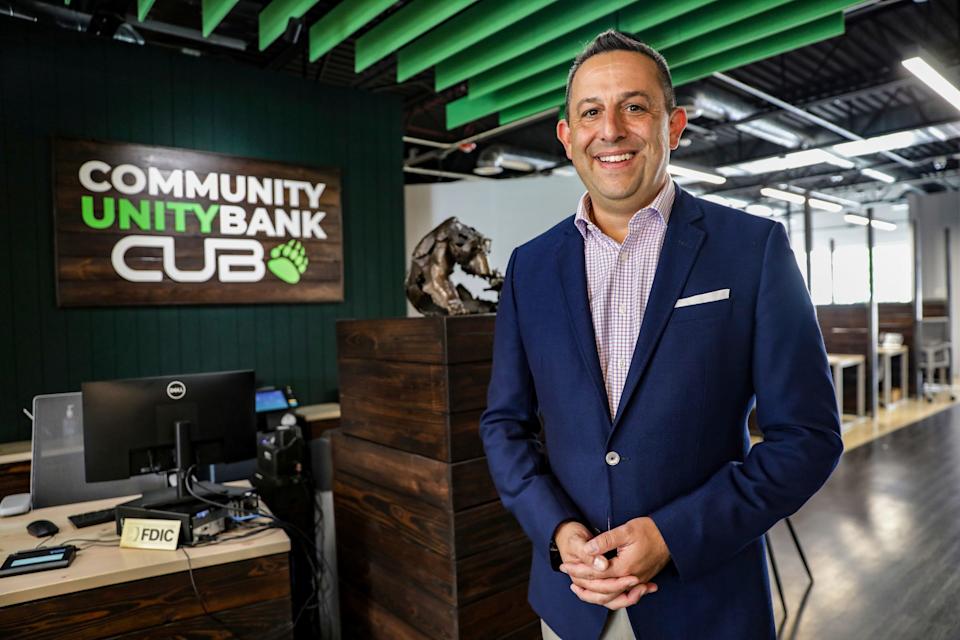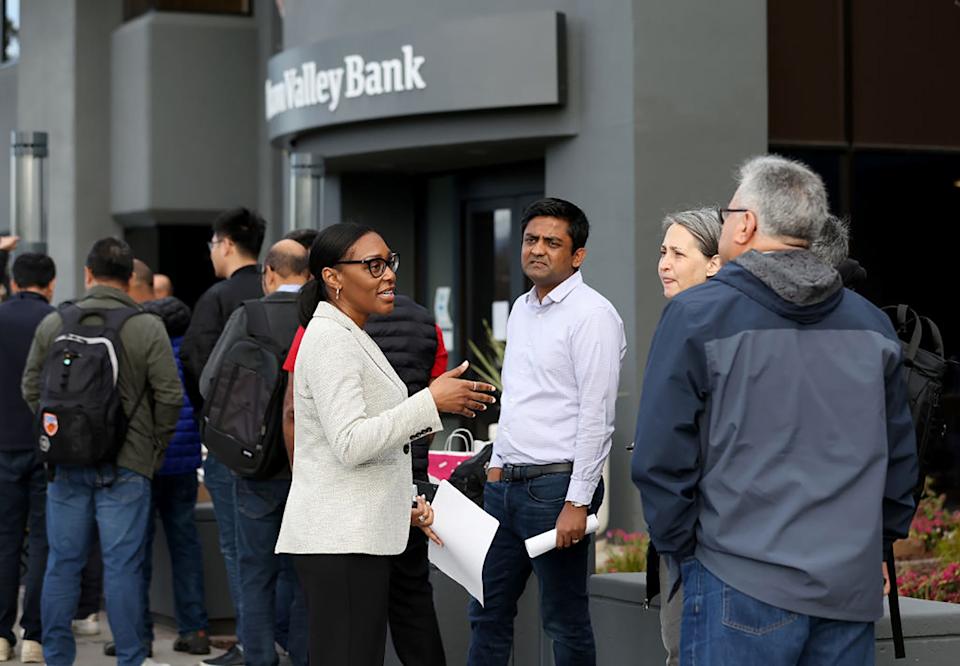Former Oakland Co. Treasurer Andy Meisner has opened just the 3rd new US bank of 2023
In the banking business this year, the news has mostly been about bank failures, emergency acquisitions and depositors fleeing for higher-yielding online accounts and money-market funds.
Now Andy Meisner, the former Oakland County treasurer and state representative, has done something a bit contrarian. This summer, he helped found what is only the second new bank to open in Michigan since the Great Recession. Nationwide, it is the third bank so far this year to get the Federal Deposit Insurance Corp. approval.

Community Unity Bank had its soft launch June 26 and is located at 34040 Woodward Ave. in Birmingham, in a storefront that was previously vacant and once a bridal shop.
Meisner, 50, is the bank’s CEO and lead organizer. In a sit-down interview inside the bank’s office, he described how years of bank mergers and consolidation in Michigan left a void in lending options in metro Detroit for small businesses that Community Unity Bank, or CUB, is ready to fill.

“We think there’s a need for small business lending in this market, and we are well positioned to help meet that need,” Meisner said. “If you want a $1 million loan right now and you go to one of the larger institutions, they may not look at it. They may find that a $20 million deal is a better fit for their business plan. So we really believe that this is a neglected space, and that the $100,000 to say $3-$5 million is where the need is.”
He anticipates that roughly 80% of CUB’s business will be small business lending, generally plain vanilla commercial loans — no cryptocurrency or marijuana businesses.
CUB will also have a menu of traditional bank services for individual customers, including checking and savings accounts, debit cards, home mortgages, certificates of deposit and more.
While CUB received its state and FDIC approvals last month and is now open for business and signing up customers, the bank is still awaiting final approval from the Federal Reserve before it rolls out its full suite of services. Meisner said they anticipated a formal launch and ribbon-cutting closer to Labor Day.
more: In the local and national mortgage war, is UWM’s Mat Ishbia a genius or ‘bully?’
more: Oakland County city declares noise war on muscle cars and motorcycles
“We have a large number of folks who have kind of made a verbal commitment that ‘when you’re ready for us, we’re going to come on over,’ ” Meisner said of the bank’s future customers.
Awkward timing?
One could consider 2023 an awkward time to open a new community bank anywhere in the US
Banks in general have been seeing an outflow of customer deposits from regular savings accounts to higher-yielding money market funds and to newer online banks that pay significantly higher interest. This type of competitive environment can make it harder — and more expensive — for a small new bank to attract deposits.

There have also been high-profile failures this year of three banks — Silicon Valley Bank, Signature Bank and First Republic Bank — that prompted fears about the health and stability of regional banks across the country. Although the federal government stepped in to protect depositors at the failed banks who were over the $250,000 FDIC deposit insurance maximum, the situation nonetheless spooked some customers of midsize banks, who reportedly moved deposits over to larger banks perceived as safer and “too big to fail .”
Meisner said the unique circumstances that doomed the trio of banks, such as cryptocurrency lending and overconcentration in tech startups, would not apply to Community Unity Bank. So he is not worried.
“There really were some cardinal rules broken by the institutions that failed,” he said.
And being an entirely new bank gives CUB the benefits of a clean slate, Meisner said, with no exposure to potentially bad past loans. CUB is also arriving with fresh new technology for its online and mobile banking, he said, a contrast to older banks that may have cobbled together various tech over the years.

CUB has 13 employees, all of whom have worked in banking for years. The bank’s 10-member board is chaired by businessman Ronald Klein.
Fewer overall banks
The number of banks in the US and Michigan has been declining for decades after waves of bank mergers and acquisitions and even a few failures.
Nationwide, there were 12,347 FDIC-insured commercial banks with 54,302 total branches in 1990, according to the FDIC. In 2022, there will be 4,136 banks with 71,007 branches.
Michigan had 235 banks with 2,174 branches back in 1990, the FDIC data show. Last year, Michigan had 74 banks and 2,129 branches.
Professor Anand Jha at Wayne State University’s Mike Ilitch School of Business said legislative changes at the federal level in the 1990s were key factors in the flurry of bank mergers and acquisitions.
One was passage of a 1994 interstate banking bill that allowed banks to buy banks in other states and also eliminated a requirement that they operate separate subsidiaries in each state.
The other was the 1999 repeal of the Great Depression-era Glass-Steagall Act, which had prohibited deposit-taking banks from engaging in investment banking activities, and vice versa.
Those changes in law allowed banks to grow and ultimately become more cost-efficient than many smaller banks.
“Once they (larger banks) were able to provide good service at lower cost, the smaller banks were at a big disadvantage and they started being bought out,” he said.
The FDIC this year has approved only two other applications for new banks: Adelphia Bank in Columbus, Ohio, and Beach Cities Commercial Bank in Irvine, California.
Before CUB, the last new bank in Michigan was MiBank in Bloomfield Township, which opened in 2019. And prior to MiBank, no new bank had opened in the state since early 2009.
While there was an FDIC application in spring 2022 for a new bank in Traverse City, to be called Sovereign Bank, the application was voluntarily withdrawn and the bank didn’t happen.
MiBank Chairman and CEO Rob Farr said his bank is also primarily aimed at serving the needs of businesses and entrepreneurs.
New bank openings in the US tend to happen in cycles, Farr said, “where you’ll see a number of institutions open up, and then you won’t see any for a while. There was a little spurt when we opened in 2019 — we were one of a handful of banks. But ever since 2019, there has just been kind of a trickle.”
Capitalize the bank
To get money to open a new business, a person may visit a bank.
To get money to open their new bank, Meisner and other CUB organizers raised about $28.6 million in startup and operating capital from 145 investors. These investors bought shares in the bank.
“It is almost exclusively the area of individuals who might want to diversify their portfolio,” Meisner said. “They understand that it’s a fairly conservative industry and that it’s a long-term investment, but one that we think the intensive nature of the regulation affords some guardrails that you don’t have in every industry.”
The duration of these shareholders’ investment “could be for as long as the bank is a bank,” he said. “There are a number of institutions in Michigan that have been around for 100-plus years. And so maybe it will be stock that they pass down to their kids and then their grandkids. But it’s tough to say; I just hope it goes up in value.”
Meisner said CUB anticipates growing its assets to about $75 million by the end of its first year of business.
Public service to banking

Meisner lives in Huntington Woods with his wife, Sara, and their three young sons. Oak Park Major Marian McClellan is his mother.
Meisner served as Oakland County treasurer from 2009 to 2021, and before that was a Democratic state representative for six years for the 27th District, which includes Hazel Park, Ferndale, Pleasant Ridge, Huntington Woods, Oak Park and Berkley. In 2020, he ran for Oakland County Executive and he lost to Dave Coulter in the Democratic primary.
While in the Legislature, he attended law school at the University of Detroit Mercy. Meisner said he did consider a possible law career before deciding to go into banking after his time as treasurer.
“I looked into it a little bit,” he said, “(but) I’ve always been a fan of the entrepreneur and an admirer of the entrepreneurial spirit, and I decided that I really wanted to follow that entrepreneurial path.
“And when I realized that there really was a need in the community for a community bank that could do small business lending and kind of supplement offerings for families, I found it to be more invigorating and kind of a multidisciplinary challenge.”
Asked whether his connections in Oakland County were helpful in lining up the bank’s initial investors, Meisner emphasized that he wasn’t the attraction. It was more about the bank’s “all-star” board, its experienced management team and its business plan, he said.
“Shareholders had to buy into a lot more than just me,” he said. “And frankly, more than anything, is the market. Oakland County is a spectacular place. It is a place that has $84 billion in deposits, which is more than some countries.”
Contact JC Reindl: 313-378-5460 or [email protected]. Follow him on Twitter @jcreindl.
This article originally appeared on Detroit Free Press: Andy Meisner help found Community Unity Bank in Birmingham
